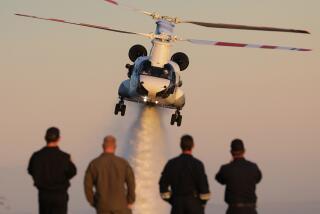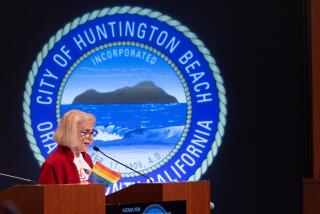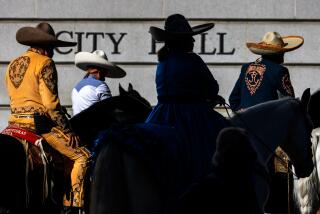AIRPORT: Sunday, Holiday Ban : Torrance Council Votes for Airport Compromise
TORRANCE — Calling it a compromise that homeowners and pilots can live with, the City Council voted this week to make permanent a moratorium on airport flight training operations on Sundays and holidays, but lifted it on Saturdays.
“Part of you want it all off, the other part want it all on,” Mayor Jim Armstrong told the handful of pilots and residents who remained until after 11:30 p.m. Tuesday for the council’s 5-2 decision. “But maybe the best compromise is where nobody is completely satisfied.”
The homeowners displayed their dissatisfaction early in the discussion when they challenged the accuracy of a study on the effect of the moratorium on pilots and residents near the Torrance Municipal Airport.
The Wyle Laboratories study concluded that during the first 12 months of the moratorium, all flight operations at the airport decreased only 3% and flight training by 11%. The study found no “appreciable change” in airport noise traceable to so-called touch-and-go operations, in which student pilots practice take-offs and landings.
The study said that only 8% of the 400 residents surveyed by telephone perceived a decrease in aircraft noise levels. “Most felt the annoyance was the same or they did not perceive a difference,” the study said.
Of 100 pilots surveyed, 34% said there was noise reduction and 16% said they had to change flying schedules and training locations.
Flight school operators polled said they experienced a 11% to 38% decrease in business, and all agreed the moratorium had negatively affected them. They said the weekend moratorium did not shift business to weekdays, but rather sent clients to other airports.
E. J. Alexander, who owns a training school at Torrance Airport, said that if the moratorium was not lifted it would be “a travesty on justice. Haven’t we suffered enough?”
But airport neighbors complained that the study did not include enough residents and that pilots had intentionally flown lower and louder to distort the study.
“It was biased unfairly by the people it was supposed to study,” said Ed Green, a resident.
“It is grossly inaccurate data,” said another resident, Bernie Hollander. “We are hurt by the noise, hurt badly.”
Councilman George Nakano said the report had been tainted by a suit filed by attorney-pilot Clark Garen, who had asked the court to force the city to raze the homes of residents who complained about airport noise.
(Garen’s suit was dismissed in federal court and Garen was hit with a $250,000 sanction for filing the suit, which a judge said lacked merit. Garen was also ordered to pay about $100,000 in attorney fees. Garen is currently appealing the sanction and attorney fees.)
Nakano suggested that the entire ban be made permanent, but could get only two other votes, from Councilwoman Katy Geissert and Councilman Tim Mock.
Only Nakano and Geissert voted against lifting the ban on Saturdays.
Councilman Dan Walker said it was the City Council that set the criteria for the study and now that the data is in, “we can’t now turn around and say it doesn’t say what we want it to say and reject it.
“On balance, the compromise reached by the Airport Commission was the prudent one. Hopefully, the community can accept it,” he said.
The Airport Commission had voted 5 to 1 for the change.
The City Council established the first moratorium on flight training on Dec. 6, 1983, for Sundays and holidays after complaints from residents. It was supposed to be a six-month test, but on June 12, 1984, it was extended for another six months and expanded to include Saturdays.
It was extended again in December and expanded to include Fridays to allow Wyle Laboratories to study the effect of the moratorium on residents and pilots.
More to Read
Sign up for Essential California
The most important California stories and recommendations in your inbox every morning.
You may occasionally receive promotional content from the Los Angeles Times.










